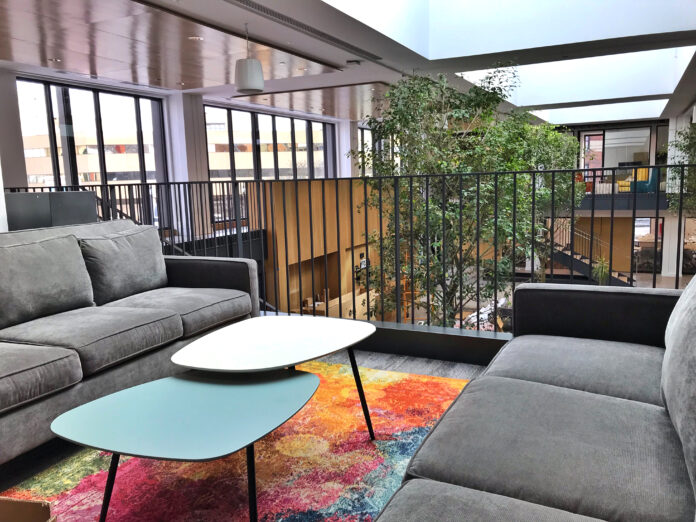
MUSCATINE, Iowa – A plaster bust of Renaissance Man, Nicolaus Copernicus, watches over final construction and installation activities as new life comes to an old building. The location at 304 Iowa Ave. that was home to Muscatine’s public library for more than 100 years is now the global headquarters for the Stanley Center for Peace […]
Already a subscriber? Log in
Want to Read More?
Get immediate, unlimited access to all subscriber content and much more.
Learn more in our subscriber FAQ.
- Unparalleled business coverage of the Quad Cities
- Immediate access to subscriber-only content on our website.
- 52 issues per year delivered digitally, in print or both.
- Support locally owned and operated journalism.
Do you want to read and share this article without a paywall?
Click here to purchase a paywall bypass linkMUSCATINE, Iowa – A plaster bust of Renaissance Man, Nicolaus Copernicus, watches over final construction and installation activities as new life comes to an old building. The location at 304 Iowa Ave. that was home to Muscatine’s public library for more than 100 years is now the global headquarters for the Stanley Center for Peace and Security.
Executives at The Stanley Center told the QCBJ that Copernicus has traveled with them for every move into each new space. Now, wherever you look you see elements that make this rebirth one of the most environmentally-friendly buildings in the world.
In 2020, the Muscatine-based international non-profit policy and advocacy organization acquired the former Muscatine Public Library building and accepted the Living Building Challenge to renovate it into its new headquarters.
Under the direction of Neumann Monson Architects in Iowa City and Graham Construction of Cedar Rapids, the $10 million project began with design work in 2020 to create a building to the most rigorous and comprehensive standards in place today for sustainable design and construction. Crews began construction with a ground ‘healing’ in the fall of 2021.
Once the headquarters is finished, the building will go through a 12-month-long data collection and verification process to be certified as a Living Building. The Stanley Center will be the first-ever in Iowa and one of only 30 Living Buildings in the world. The center’s team is moving into the new facility this month.
Perhaps the most significant building standard is that it must be ‘net positive’ in terms of energy and water consumption. To that end, the building has incorporated a solar energy system designed to produce more than it needs.
“For the Living Building Challenge, we have to produce 105% of our usage,” said Dane Lovell, facilities maintenance superintendent for the Stanley Center. “Our system is designed to 110% – so we got a little extra figured in. We are installing bifacial solar panels on the roof that actually catch the reflected light from the white roof to help get that extra.”
Mr. Lovell told the QCBJ that part of the Living Building Challenge is producing that extra 5% to help the environment and others. A project has to be net positive, not net equal. The Stanley Center also has on-site battery storage which will allow it to operate for five days off the grid. Once the batteries are fully charged, any energy produced at the building goes back on the grid.
A Living Building is defined as ‘regenerative’ by creating a net-positive for the world and its community. It adds renewable energy to the grid; it captures and treats rainwater for the building’s use; it avoids red-list chemicals in construction materials; it reduces landfill waste; it creates aesthetic beauty; it feeds people; and it fosters a positive environment for the health and well being of those who occupy the space.
The challenge program is administered by the International Living Future Institute in Seattle, Washington.
The Stanley Center also features a self-sustaining water collection, treatment, and containment system.
“Once we’re all up and running, we’re not supposed to be hooked up to city water except for the fire suppression system,” said Mr. Lovell. “The Living Building Challenges wants you to do everything on site. They want you to collect your water, treat your sewer, and not be tied onto any city services. But with the small footprint here and the code requirements, we can’t treat our sewage.
“So we’re using the sewer system, but to offset that, we’re purchasing more efficient shower heads, washers and dryers for MCSA to save them the amount we are using,” Mr. Lovell added.
MCSA – the Muscatine Center for Social Action – is a nonprofit organization located across the alley from the Stanley Center. It provides housing, basic health care, educational and support services for those in need in Muscatine County.




